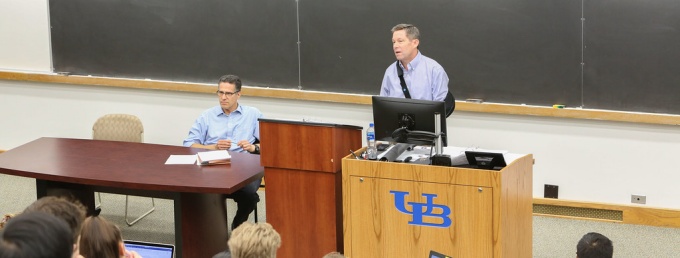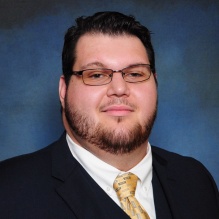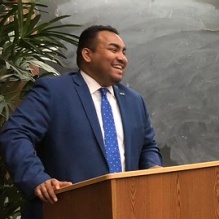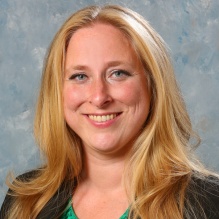
The American Constitution Society in partnership with the Federalist Society hosted Sixth Circuit U.S. Court of Appeals Judge Jeffrey S. Sutton who discussed the role that state courts and state constitutions have in protecting individual liberties.
A banner year for progressive student group
One of UB School of Law’s most active student groups is wrapping up a robust year that brought rigorous discussion to bear on some of the toughest issues in law and in society.

Trek Fulater ’20
The law school’s campus chapter of the American Constitution Society, a national group devoted to a progressive understanding of the U.S. Constitution, prides itself on engaging even its philosophical foes in productive conversation.
“We love having people on both sides,” says Trek Fulater ’20, the chapter’s outgoing president. “Screaming at the top of your lungs about a topic and not engaging at all with the people who disagree with you is just preaching to the choir. When we have these kinds of engagements, we try to ask, how does this apply to the average person and what does it mean? We want to take the discussion out of technical questions of law and bring it back to these fundamental rights.”

Mohammed Alam ’20
Mohammed Alam ’20, who as the chapter’s vice president led the organizing of much of the group’s programming, says an expansive view of what the Constitution guarantees “is important to us not just as students but as future attorneys. This understanding ultimately shapes the kind of attorneys we are going to be. We want our advocacy to be rights-oriented.”
That orientation informed the group’s final program of the year, titled “Reproductive Rights in Crisis,” organized with the instrumental assistance of Brian Whitney '20. Co-presented with the OUTLaw student group, the April 14 event was held as a Zoom seminar, and drew about 70 attendees. It had special urgency because of the current health crisis, Alam says, because many states have deemed abortion services non-essential in deciding what businesses would be allowed to continue during the outbreak.
The two-hour conference featured UB Law Professor Lucinda Finley and Associate Professor Michael Boucai; Associate Professor Tia Palermo of UB’s Department of Epidemiology and Environmental Health; and Leslie Fineberg of Planned Parenthood of Central & Western New York. They discussed and debated a wide range of recent Supreme Court and state court decisions that have had the effect of reducing access to reproductive choice.
The Zoom attendees included UB School of Law students, representatives of local nonprofits and law firms, law students from other schools across the country, and senior staff from the national American Constitution Society.
It was the capstone to a busy programming year for ACS, a result of the hard work of the entire eboard which also organized the following:
- A Nov. 13 discussion on “Gerrymandering and the Future of American Democracy,” with speakers including Buffalo attorney Frank Housh ’93, chair of the Western New York Lawyer Chapter of the American Constitution Society, a chapter for practicing attorneys.
- “Behind the Curtain” on Oct. 29, which brought Thomas P. Franczyk, now retired as an Erie County Court judge, and New York State Court of Appeals Judge Eugene M. Fahey ’84 to the law school for a discussion of how judges administer justice under the rubric of the federal and state constitutions. “It was a fascinating look at the Constitution in real time,” Fulater says.
- Jointly with UB Law’s chapter of the conservative Federalist Society, an Oct. 1 appearance by Sixth Circuit U.S. Court of Appeals Judge Jeffrey S. Sutton. Sutton’s conversation with Professor James Gardner stemmed from Sutton’s new book arguing that American constitutional law should recognize the role that state courts and state constitutions have in protecting individual liberties.

Karen Lillie ’22
The pace of programming will continue under a new executive board which took office on May 1, led by incoming President Karen Lillie ’22.
“We have tons of ideas that we want to get into,” Lillie says, “and we already have things planned for the next two years.” The officers are surveying current 1Ls and 2Ls to ask about their interests, and they’re thinking about how to make a difference in the upcoming presidential election, including pressing for classes to be canceled on Election Day and running a voter registration drive. They’re also looking to build stronger bonds with the Western New York community, both in service opportunities and by inviting more government officials to O’Brian Hall.
Lillie notes that there’s not a lot of time in class to discuss issues of progressive Constitutional interpretation, and so the American Constitution Society gives students interested in a continuing expansion of constitutional rights a forum for sharing ideas. The national organization, she says "puts the information out there with the facts behind it and encourages people to get involved and participate. It’s a movement for equity and access, and that speaks to a lot of people who have those same ideas and are looking for a place to share them."